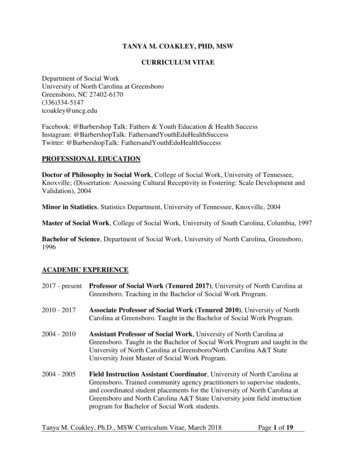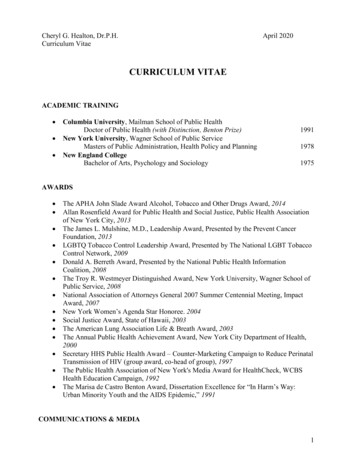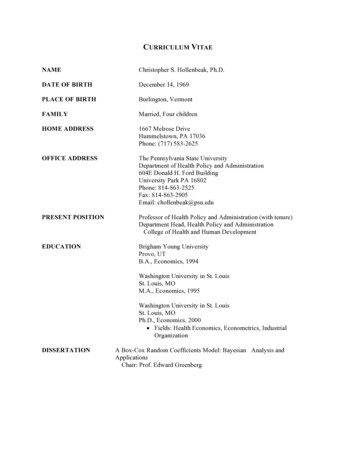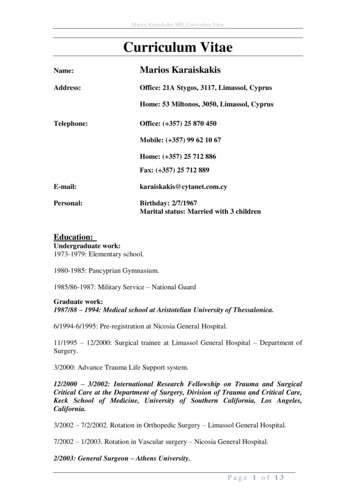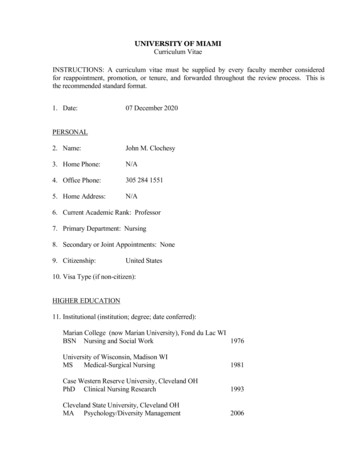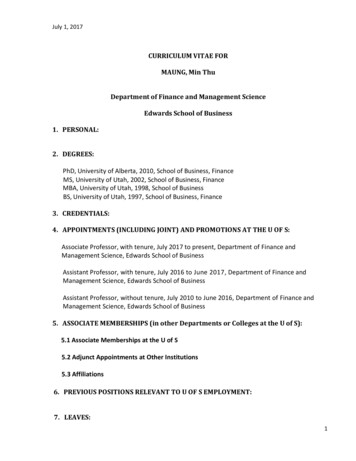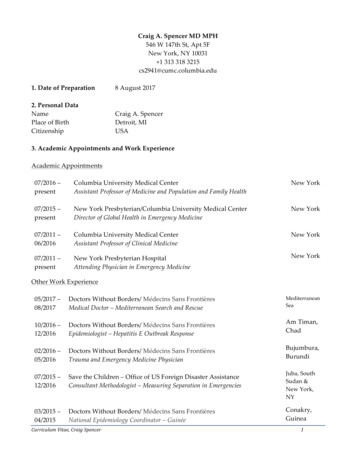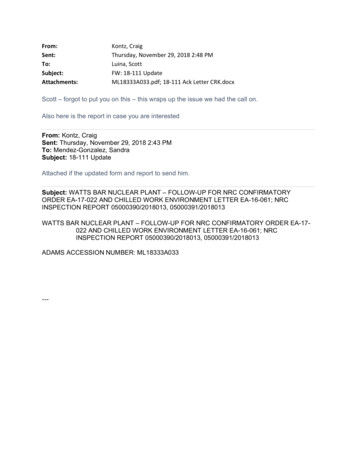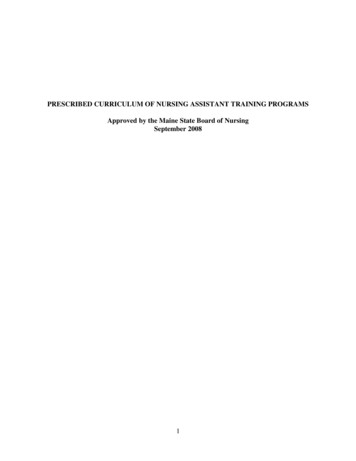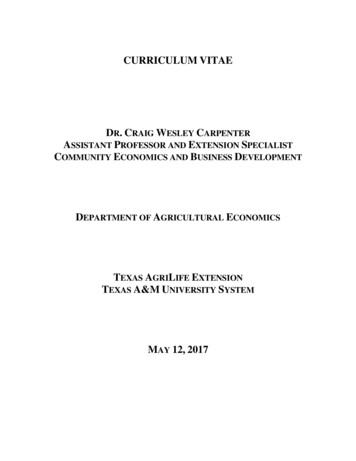
Transcription
CURRICULUM VITAEDR. CRAIG WESLEY CARPENTERASSISTANT PROFESSOR AND EXTENSION SPECIALISTCOMMUNITY ECONOMICS AND BUSINESS DEVELOPMENTDEPARTMENT OF AGRICULTURAL ECONOMICSTEXAS AGRILIFE EXTENSIONTEXAS A&M UNIVERSITY SYSTEMMAY 12, 2017
Craig Wesley CarpenterCurriculum VitaeTable of ContentsI. PERSONAL INFORMATION. 1II. EDUCATION. 1III. EXPERIENCE . 1Current Position . 1Past Positions and Experience . 2IV. EXTENSION ACTIVITIES (100% Budgeted; 50% Time Spent). 3Program Statement . 3Summary of Program Development, Implementation, and Evaluation . 3Extension Presentations Summary . 4Extension Presentations . 5Unsolicited Comments . 6Program Impacts . 6Program and Organizational Support. 7V. RESEARCH ACTIVITIES (0% Budgeted; 40% Time Spent) . 7Summary of Major Accomplishments . 7Research Grants and Contracts Summary. 8United States Census Bureau Research Projects . 8Research and Professional Presentations Summary . 8Research Presentations (12 total) . 9Role in Obtaining External Funding . 10VI. TEACHING ACTIVITIES (0% Budgeted; 5% Time Spent). 10Program Statement . 10Graduate Student Committee Involvement . 10VII. SERVICE ACTIVIES (0% Budgeted; 5% Time Spent) . 11Journal Article Reviewer . 11Reviewer for Miscellaneous Products . 11Service Roles . 11Professional Improvement Activities . 11United States Census Bureau Research Projects . 12Professional Affiliations . 12VIII. GRANTS AND CONTRACTS . 13Craig Wesley CarpenterCurriculum Vitae as of May 12, 2017TOC
Grants and Contracts Summary . 13Funding Received – External Competitive . 13IX. PUBLICATIONS . 14Publications and Scholarly Work. 14Journal Articles – Refereed (1 total) . 14Center for Economic Studies Working Paper Series – Internal Review (2 total) . 14Journal Articles – Refereed, Submitted (4 total) . 14Extension Publications (6 total) . 15Publications in Development (6 total) . 15Dissertation or Thesis (2 total) . 16X. PROFESSIONAL HONORS AND AWARDS . 16XI. APPENDIX. 17Your Entrepreneurial Ecosystem Blog Posts (6 total) . 17Craig Wesley CarpenterCurriculum Vitae as of May 12, 2017TOC
CURRICULUM VITAETexas AgriLife Extension ServiceTexas A&M University SystemI. PERSONAL INFORMATIONName:Rank/Title:Craig Wesley CarpenterAssistant Professor and Extension Specialist –Community Economics and Business DevelopmentDepartment:Agricultural EconomicsCampus Address: TAMU 2124600 John Kimbrough Blvd., Suite 337College Station, TX 77845979.845.1941ccarpenter@tamu.eduDate of Appointment/Last Promotion:June 2016II. EDUCATIONPh.D.Agricultural, Food, and Resource Economics, Michigan State University, 2016.Areas of concentration: Economic Development, Econometrics and Statistics,Applied Microeconomics.B.A.Political Science, Economics and Business, Kalamazoo College, Kalamazoo, MI,2011. Program included year of study at the London School of Economics,London, England.III. EXPERIENCECurrent PositionTexas A&M UniversityAssistant Professor and Extension Specialist, Community Economics and BusinessDevelopment, College Station, TX. June, 2016-present.Detailed Position Description:Overall responsibilities include efforts to plan, develop, implement and evaluate curricula,extension education programs, and applied research related to Community Economics andBusiness Development affecting clientele. Educational program delivery includes developinggrant and contract proposals, extension and peer-reviewed publications, workshops, conferences,Craig Wesley CarpenterCurriculum Vitae as of May 12, 2017Page 1
electronic and mass media releases. Cooperation is expected with campus and district basedextension and research faculty, district extension administrators, county extension agents,regional program leaders, and other specialists, as necessary in developing and deliveringnationally recognized programs.Past Positions and ExperienceMichigan State University2011-2016 – Graduate Research Assistant, North Central Regional Center for RuralDevelopment, Department of Agricultural, Food, and Resource Economics, MichiganState University, East Lansing MI. Review literature on immigration in the Midwest andimmigrant entrepreneurship in general. Publish reviews for regional, state, andcommunity development leaders. Examine the impact of immigrant entrepreneurship oncommunity development.Albion College2014-2015 – Visiting Instructor of Economics and Management, Principles of Microeconomics,Intermediate Microeconomics, Economic Statistics, Albion, MI. Full time (3 and 3) Fall2014 and Spring 2015 semesters. Created 12 lectures each week and delivered relevantcourse materials for all grades. Responsible for grading and twelve hours of office hoursand student interaction per week.Kalamazoo College2010-2011 – Teaching Assistant, Principles of Economics, Kalamazoo College, Kalamazoo MI.Fall 2010, Winter 2011, Spring 2011 quarters. Graded coursework and convened weeklyreview sessions.Other Experience2010 – Intern, External Affairs, Wayne State University School of Medicine, Detroit, MI.Researched and presented regulations on meaningful use of electronic medical recordssubsidies. Compiled research and data for presentation to United States Senator CarlLevin regarding grant funding from the NIH for the Perinatology Research Branch.2010 – Microfinance Brigade Member, Global Brigades, Pajarillos, Honduras.Interviewed villagers and discussed potential business plans. Created and presentedbusiness plan to build grain silos so villagers could sell grain off-season and nearlydouble their profit. Raised 1,000 for an annually renewing no interest loan to facilitatethe business plan2009 – Intern, Texas Council on Economic Education, Houston, TX. Created curriculum on“unbanked” immigrant. Analyzed post-conference knowledge gain by teachers.Craig Wesley CarpenterCurriculum Vitae as of May 12, 2017Page 2
2008 – Intern, Schulman and Associates, P.C., Detroit, MI. Researched lower court ruling andprecedent for appellate brief2008 – Tutor, Woodward Elementary School, Kalamazoo, MI. Helped underprivileged studentswith study skills and basic arithmetic concepts.IV. EXTENSION ACTIVITIES (100% BUDGETED; 50% TIME SPENT)Program StatementDr. Carpenter’s primary goal is to help communities and businesses organize, understandresearch and local economic data, make informed decisions, and take action about communityand economic development issues. Thus his objective is to develop research-based educationaland data materials on local/regional economic and business development issues. His programsunderscore regional economic coordination, cooperation, and action, resulting fromunderstanding the regional context based on quantitative and qualitative data. His current andfuture efforts include outreach through workshops, Extension publications, and online resourcesrelated to local economic and business data, analysis tools, and business retention and expansion.Dr. Carpenter’s primary appointment as an Extension Specialist guides most of his researchthrough the needs of Extension clientele and national best practices in Extension.Summary of Program Development, Implementation, and EvaluationStronger Economies TogetherIn 2016, AgriLife’s Community Resources and Economic Development (CRED) team joinedPhase VI of the national USDA Stronger Economies Together (SET) program. The SET programhelps local community leaders from at least three counties to create a regional economic visionand supporting goals based on local economic and demographic realities and opportunities.Texas’s Phase VI region is the Texas Forest Country, formerly Deep East Texas, which includesthe Angelina, Houston, Jasper, Nacogdoches, Newton, Polk, Sabine, San Augustine, San Jacinto,Shelby, Trinity, and Tyler counties. The SET process involves synthesizing large amounts ofeconomic data, presenting economic and community development information, and coaching theregional teams in writing a plan, as well as providing feedback on plans written by regionalteams in other states. The region continues to refine and prepare to implement its economicdevelopment plan, but with the plan almost complete, Dr. Carpenter had the opportunity topresent their regional economic development plan at the Texas Governor’s Small BusinessForum. See “Program Impacts” sub-section below for details on Dr. Carpenter’s contributions.Community-Opportunity Matching Program, in developmentDr. Carpenter is the PI on an integrated (research and Extension) USDA-NIFA grant that beganfunding in Spring 2017. This project uses confidential data from restricted-access governmentdatabases to create algorithms that help researchers and practitioners more accurately estimaterural business establishments, employment, and payroll using publically available data, which isoften complicated by disclosure issues in rural communities. The long-term goal is to spur ruraleconomic growth by focusing entrepreneurial and business development efforts on industriesCraig Wesley CarpenterCurriculum Vitae as of May 12, 2017Page 3
with a high probability of success in the local area. Specifically, this project will examine whichtypes of businesses have a high probability to succeed or fail in a given county and industrybased the characteristics of the particular county and demographic, geographic, and socioeconomic characteristics of counties where that type of business is frequently found. Our modelswill account for these characteristics and in turn examine which industries are smaller thanpredicted (and thereby may have an opportunity to expand) and which industries are larger thanpredicted (and thereby may be at risk or worthy of case studies determining factors accountingfor their success). Further, this project will create a mechanism through which rural decisionmakers and economic development practitioners can understand opportunities and threats forentrepreneurs in their area.Business Retention and Expansion, in developmentDr. Carpenter completed the online course on Business Retention and Expansion from thenationally renowned program at the University of Minnesota, becoming a certified coordinator inBusiness Retention and Expansion. Business Retention and Expansion certifications are the markof a BRE professional and certify that one has the knowledge and experience to lead economicdevelopment activities in his or her community. They represent professionals in the economicdevelopment field from across the globe in order to educate, train, and promote best practices forincreasing economic activity and growth in both urban and rural areas. They promote and traineconomic developers through a variety of workshops and conferences focused on both individualas well as broad-based skills. Business retention and expansion refers to all community economicdevelopment efforts aimed at helping local businesses survive and grow within the community.Dr. Carpenter plans on developing numerous Extension publications explaining the businessretention and expansion process, while also creating an original train-the-trainers program.Different versions may include the classic business retention and expansion, and an industrialcluster specific program.Your Entrepreneurial Ecosystem (total page views 20)Dr. Carpenter started a blog, Your Entrepreneurial Ecosystem (http://agrilife.org/eecosystem/),on which he shares new research, Extension publications, and important meetings/events. On theblog he also has an e-mail distribution list, which allows him to share his blog posts as an avenueto announce important events and programs. Blog posts are listed in the appendix.Extension Presentations TotalCraig Wesley CarpenterInvited010102Volunteer orSubmitted0211711Curriculum Vitae as of May 12, 2017Total0312713Page 4
Year20162017TotalTotal Contacts1,2951,295Extension PresentationsNational1. Carpenter, Craig Wesley, Scott Loveridge. 2017. “Which Latino-owned BusinessGrow?” Webinar presentation sponsored by the Southern Rural Development Center,March.2. Carpenter, Craig Wesley, Scott Loveridge. 2017. “Business Owner, Business, andRegional Factors that contribute and Hinder Latino-Owned Business Survival.” Webinarpresentation sponsored by NCERA-216 multi-state research project, January.3. Carpenter, Craig Wesley. 2016. “The Impact of Latino-Owned Business on LocalEconomic Performance.” Webinar presentation sponsored by North Central RegionalCenter for Rural Development, May. Accessible at:https://www.youtube.com/watch?v bIKpCFL9ApURegional4. Carpenter, Craig Wesley. 2011. “Latino Growth and Entrepreneurship in the RuralMidwest.” Presented to the Regional Research Team: Helping Nonmetro Communitiesand Underserved Entrepreneurs Grow Together, November.State5. Carpenter, Craig Wesley, Ronald McDonald, Rebekka Dudensing, and John T. Cooper,2016. USDA Stronger Economies Together, Texas Governor’s Small Business Forum &Texas Forest Country Economic Summit. Lufkin, TX, November 9.6. Carpenter, Craig Wesley. 2016. Entrepreneurship and Latino-Owned Business:Opportunities for Extension? Texas A&M Agricultural Economics Extension UnitProgram Retreat, Montgomery, TX, July.Intra-state Regional or Local Group Facilitation7. Carpenter, Craig Wesley, Rebekka Dudensing, Ronald McDonald. 2016. USDA StrongerEconomies Together, Session 5: Putting the Plan to Action. Lufkin, TX, December 15.8. Cooper, John T., Ronald McDonald, Rebekka Dudensing, and Craig Wesley Carpenter.2016. USDA Stronger Economies Together, Session 4: Finalizing the Plan. Lufkin, TX,October 12.Craig Wesley CarpenterCurriculum Vitae as of May 12, 2017Page 5
9. Dudensing, Rebekka, Ronald McDonald, Craig Wesley Carpenter, and John T. Cooper.2016. USDA Stronger Economies Together, Session 4 Preparation and SMART Goalediting. College Station, TX via Zoom conference call, October 10.10. Cooper, John T., Ronald McDonald, Rebekka Dudensing, Craig Wesley Carpenter, andJimmy Henry. 2016. USDA Stronger Economies Together, Session 3: ConnectingCapitals. Center, TX, September 14.11. Dudensing, Rebekka, Craig Wesley Carpenter, Ronald McDonald, John T. Cooper, andJimmy Henry. 2016. USDA Stronger Economies Together, Session 1 & 2 Review.Livingston, TX, August 16.12. Dudensing, Rebekka, Craig Wesley Carpenter, Ronald McDonald, John T. Cooper, andJimmy Henry. 2016. USDA Stronger Economies Together, Session 2: Evidence BasedPlanning. Nacogdoches, TX, July 19.13. Dudensing, Rebekka, Craig Wesley Carpenter, Ronald McDonald, and John T. Cooper.2016. USDA Stronger Economies Together, Session 1: Regional Data. Jasper, TX, June24.Unsolicited Comments“Keep up the good work.” “I enjoyed the meeting.” “We have wonderful opportunities in reach,just need to work together.” “Well structured and organized.” “Good session.” “Liked thediscussion on outcomes and how to consider being more effective.” “The process works.”--Local community leaders and members after participating in meetings of the Texas ForestCountry Stronger Economies Together, Texas, 2016.Program ImpactsDr. Carpenter’s support and analysis of regional economic data and development plans hashelped secure grant funding for regional economic development planning, while simultaneouslygenerating awareness and understanding to best practices and avenues for supporting regionalindustrial clusters. Highlights include: The twelve county region of the Texas Forest Country, formerly Deep East Texas, isdeveloping and implementing a regional economic development plan to rebrand andovercome long-standing economic decline and depopulation. The region continues torefine and prepare to implement its economic development plan, but with the plan almostcomplete, Dr. Carpenter had the opportunity to present their regional economicdevelopment plan at the Texas Governor’s Small Business Forum. The SET processinvolves synthesizing large amounts of economic data, presenting economic andcommunity development information, and coaching the regional teams in writing a plan,as well as providing feedback on plans written by regional teams in other states. The USDA Stronger Economies Together program combines two new paradigms ofregional economic development: industrial cluster analysis and coordinating rather thancompeting. Among other positive reviews, 92.5% of participants in the Texas ForestCountry region indicated that Dr. Carpenter’s explanation and exploration of the region’sCraig Wesley CarpenterCurriculum Vitae as of May 12, 2017Page 6
demographic and industrial cluster data and trends was fairly useful or very useful (4 or 5on a 5-point scale).Program and Organizational SupportIn pursuit of developing and delivering nationally recognized research programs, Dr. Carpenterhas applied as a principal investigator or co-PI for integrated (research and Extension) grantedprojects and successfully securing funding from some of those applications. His proposals seekto collaborate with Extension and Department faculty, while simultaneously bringing nationaland interdisciplinary scholars to contribute to the design and development of innovative andnationally recognized Extension and research programs.V. RESEARCH ACTIVITIES (0% BUDGETED; 40% TIME SPENT)Summary of Major AccomplishmentsTexas Federal Statistical Research Data Center. Designing a research project toimprove United States Census Bureau data related to ethnic entrepreneurship led toimproved internal Census microdata, two Center for Economic Studies discussion papers,three submitted refereed journal articles, two working papers, and seven invitedpresentations. Pursuant to leveraging his access and experience with the data, Dr.Carpenter is the PI on an awarded grant of 500,000 to USDA-NIFA collaborating withcolleagues in Texas A&M AgriLife, Michigan State University, and Iowa StateUniversity. The grant is a joint application to USDA, the U.S. Census Bureau, and theU.S. Internal Revenue Service to fund the generation of publicly available countysummary measures on industrial establishment counts and employment. Such measureshave the potential for nationwide use in Extension programs, building Dr. Carpenter’snational reputation. USDA has approved and funded the project, giving the proposal thehighest possible rating, putting it in the top 14% of proposals nationally.Given the lengthy approval process and exclusive nature of using the confidentialmicrodata only available in Federal Statistical Research Data Centers, Dr. Carpenter isdeveloping multiple other proposals as a means to become an expert in the use of “bigdata” and entrepreneurship. Specifically, proposals in development include anexamination of the survival, growth, and other dynamics of “vet-repreneurs” (veteranentrepreneurs) from 1990-2012, as well as policy analysis using numerous Censuses ofAgriculture from 1964-1982. Dr. Carpenter hopes that this research builds on his currentwork related to ethnic entrepreneurship using “big data.”Craig Wesley CarpenterCurriculum Vitae as of May 12, 2017Page 7
Research Grants and Contracts SummarySince Last PromotionType and RoleTotal dollars Dollars allocatedto all PIsto your programExternal CompetitivePI 500,000 323,736Co-PI 26,400 5,280Total 526,400 329,016CareerTotal dollars Dollars allocatedto all PIsto your program 500,000 26,400 526,400 323,736 5,280 329,016United States Census Bureau Research Projects Project #TX1742 PI. United States Census Bureau, “Understanding Demand Thresholdsand Generating County-Level Estimates with Publicly-Available Methods.” Specialproject housed in the Texas Federal Statistical Research Data Center to improve UnitedStates Census Bureau data. 2017-2020. Project #TX1320 co-PI. United States Census Bureau, “Local Credit Availability and thePerformance of Small and Young Businesses.” Special project housed in the TexasFederal Statistical Research Data Center to improve United States Census Bureau data.2014-2018. Project #AT1215 PI. United States Census Bureau, “Immigrant Entrepreneurship with aFocus on Latino Entrepreneurship.” Special project housed in the Atlanta FederalReserve to improve United States Census Bureau data. 2014-2017. Special Sworn Status. Special Sworn Status individuals are subject to the same legalobligations and penalties as regular United States Department of Commerce staff and areable to access confidential Census Bureau data for which they have a need to know toconduct their operations, research, etc. The Census Bureau gives Special Sworn Status toindividuals under Title 13, Section 23, only if confidential data are needed to undertake atask that will contribute substantially to Census Bureau programs and only if the data canbe adequately protected. 2014-present.Research and Professional Presentations TotalCraig Wesley CarpenterInvited020203Volunteer orSubmitted041308Curriculum Vitae as of May 12, 2017Total0615012Page 8
Research Presentations (12 total)1. Carpenter, Craig Wesley. 2017. “Using Big Data in Research & Extension forCommunity Economics and Business Development.” Texas A&M University,Department of Agricultural Economics. College Station, TX, April.2. Carpenter, Craig Wesley, Scott Loveridge. 2017. “Latino-Owned Business EmploymentGrowth and Impact.” W.E. Upjohn Institute for Employment Research. Invitedpresentation. Kalamazoo, MI, March.3. Loveridge, Scott, and Craig Wesley Carpenter. 2017. “Survival and Impact of Latinoowned Business.” Western Michigan University, Department of Economics. Kalamazoo,MI, January.4. Carpenter, Craig Wesley, Scott Loveridge. 2016. “Economic Growth and Latino-OwnedBusinesses.” Minneapolis Federal Reserve. Invited presentation. Minneapolis, MN,November.5. Carpenter, Craig Wesley, Scott Loveridge. 2016. “Which Latino-Owned BusinessesSurvive? A Comprehensive Picture from Restricted-Access U.S. Census Data.” AnnualNorth American Meetings of the Regional Science Association International.Minneapolis, MN, November.6. Carpenter, Craig Wesley, Scott Loveridge. 2016. “The Impact of Employment by LatinoOwned Businesses.” Annual North American Meetings of the Regional ScienceAssociation International. Minneapolis, MN, November.7. Carpenter, Craig Wesley, Scott Loveridge. 2016. “Using Big Data in the Texas FederalStatistical Research Data Center to Examine Latino-owned Business.” Department ofAgricultural Economics, Texas A&M University, Faculty Presentation Series. CollegeStation, TX, October.8. Loveridge, Scott, Craig Wesley Carpenter. 2016. “The Impact of Latino-Owned Businesson Local Economic Performance and the Use of Federal Statistical Research DataCenters.” Department of Agricultural, Food, and Resource Economics, Michigan StateUniversity, Brown Bag Series. East Lansing, MI, October.9. Carpenter, Craig Wesley, Scott Loveridge. 2016. “The Impact of Latino-Owned BusinessEmployment Share on Local Economic Performance: A Sector-Level Assessment Basedon Confidential Census Data.” Federal Statistical Research Data Center NationalResearch Conference. College Station, TX, September.10. Carpenter, Craig Wesley, Scott Loveridge. 2015. “Application and Use of a CensusResearch Data Center: Observations from a User.” Mid-Continent Regional ScienceAssociation Annual Meetings. St. Louis, MO, May.Craig Wesley CarpenterCurriculum Vitae as of May 12, 2017Page 9
11. Loveridge, Scott, and Craig Wesley Carpenter. 2013. “Business Development andImmigrant Country of Origin.” Presented at the Southern Economic Association annualconference, Tampa, FL, November.12. Carpenter, Craig Wesley, Anil Rupasingha, Myriam Quispe-Agnoli, and Scott Loveridge.2013. “Latino Immigrant Entrepreneurship in the United States.” Graduate ResearchSymposium, Department of Agricultural, Food and Resource Economics, Michigan StateUniversity, East Lansing, MI, March.Role in Obtaining External FundingIn pursuit of developing and delivering nationally recognized research programs, Dr. Carpenterhas applied as a principal investigator or co-PI for integrated (research and Extension) grantedprojects and successfully securing funding from some of those applications. His proposals seekto collaborate with Extension and Department faculty, while simultaneously bringing nationaland interdisciplinary scholars to contribute to the design and development of innovative andnationally recognized Extension and research programs.VI. TEACHING ACTIVITIES (0% BUDGETED; 5% TIME SPENT)Program StatementDr. Carpenter endeavors to support students within the parameters of his Extension and Researchefforts. In pursuant to those efforts, Dr. Carpenter’s successful grant and funding applicationsinclude funding for doctoral students and undergraduate student workers. His future work willnot only include advising these graduate students, but also advising undergraduate researchprojects, providing technical assistance for research projects, counseling current and prospectivestudents, taking students to community development events, and conducting guest lectures. Inmany cases, these teaching activities introduce students to Extension programs and/or the field ofcommunity economic development. Support of Dr. Edward Rister’s Rural Entrepreneurshipprogram is mutually beneficial in terms of meeting entrepreneurs and related field experts tonetwork and discuss Extension activities, while provided support to undergraduate studentresearch projects. Ongoing support will lead to continued advising of undergraduate studentresearch projects. AGEC 425: Rural Entrepreneurship undergraduate student mentor, 2017-present.Graduate Student Committee InvolvementDegreeMS (Thesis)MS (Non-thesis)PhDSince Last PromotionChair or Co-Chair Member000000Craig Wesley CarpenterCareerChair or Co-Chair000Curriculum Vitae as of May 12, 2017Member000Page 10
VII. SERVICE ACTIVIES (0% BUDGETED; 5% TIME SPENT)Journal Article Reviewer1. Applied Economics incorporating Applied Financial Economics. 2017.Reviewer for Miscellaneous Products1. North Central Regional Center for Rural Development, Small Grants Program, Referee.February, 2017.2. United States Department of Agriculture, Stronger Economies Together Phase V,Regional Eco
Rank/Title: Assistant Professor and Extension Specialist - Community Economics and Business Development Department: Agricultural Economics Campus Address: TAMU 2124 600 John Kimbrough Blvd., Suite 337 College Station, TX 77845 979.845.1941 ccarpenter@tamu.edu Date of Appointment/Last Promotion: June 2016 II. EDUCATION

